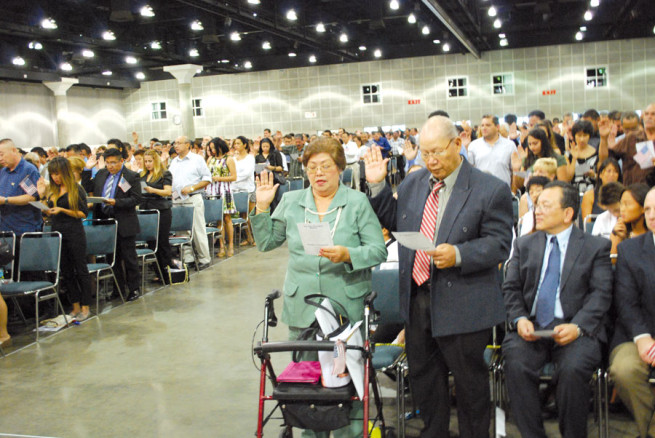506 Filipinos become US citizens in Los Angeles

Mr. and Mrs. Carlos Jainga (standing in front) were among thousands who became US citizens on September 17. USCIS PHOTO
LOS ANGELES — Filipinos in this city ranked third among nationalities with the most number of people who became naturalized US citizens on September 17, “Citizenship Day.”
A total of 506 Filipinos were among the 6,658 people from 133 different countries who took their oaths of citizenship at the LA Convention Center in Downtown.
For Carlos Jainga and his wife felt relief. He believes it will help strengthen family bonds, particularly with his children and grandchildren currently living in the United States.
“Considering my age, when many people are already retired, my newly acquired citizenship would allow me to enjoy my life with my family and see the beautiful places of the US. One may not be too old to enjoy the culture and learn from the people of a great country,” Jainga told Asian Journal.
Jainga said that “to be accepted and granted the status of US citizen” has given him a “feeling of elation and sense of fulfillment.”
Article continues after this advertisementWhile Jainga noted that becoming a US citizen “was not that really difficult,” he said that it had “an element of uncertainty and suspense.”
Article continues after this advertisement“The process requires meticulous effort in reading and understanding the requirements of each form involved in the process,” Jainga said.
His family was “hopeful” and had faith that he and his wife would be able to meet the requirements. Jainga nevertheless admitted that the process involved a great deal of studying in preparation for the naturalization test.
Addressing the roadblocks
Jainga may have been the exception to the rule, however, as most applicants still find it difficult to acquire citizenship.
According to United States Citizenship and Immigration Services (USCIS) Los Angeles County Field Office Director Nancy J. Alby, lack of access to educational resources is one of the main barriers people face when seeking citizenship.
The process of naturalization is, understandably, a tedious one that requires due diligence on the part of the applicant. In making sure that many applicants are equipped with sufficient knowledge of the application process, the USCIS launched outreach and integration grants programs, as well as citizenship corner programs.
Alby said that the outreach sessions tried to demystify naturalization, build up capacity within communities to prepare immigrants for naturalization encourage and celebrate US citizenship.
Since the establishment of the Citizenship and Integration Grant Program in 2009, USCIS has awarded approximately $33 million through 182 grants to immigrant-serving organizations that have provided citizenship preparation services to more than 78,000 permanent residents in 33 states and the District of Columbia.
Education and outreach grants
This grant program allows USCIS to expand the reach of its high-quality citizenship preparation resources by working through community organizations.
In 2014, USCIS awarded nearly $10 million in grants to 40 organizations. Located in 24 states and the District of Columbia, these groups will receive federal funding to support citizenship preparation services for permanent residents through September 2016.
In Los Angeles, USCIS runs a citizenship corner program that provides resources and training for library staff across 73 public libraries. Given the accessibility of LA public libraries, the program allows USCIS to take one step further in reaching out to potential applicants.
While lack of education may just be one of the so-called roadblocks to citizenship, addressing this is still a significant step in helping immigrants enjoy the benefits of citizenship.
“There are more resources available for people preparing to become US citizens than ever before, which in turn has demystified the naturalization process and enables applicants to better prepare for the test,” Alby said.
She said that people interested in becoming a US citizen someday shouldn’t hesitate in using the resources that the USCIS has made available. The United States, after all, is a melting pot of immigrant communities from around the world, she added.
“Immigrants in the United States have always had a profound impact on our country and the world,” Alby said. “They strengthen the fabric of our nation with their contribution to American society and prosperity. Citizenship Day is an opportunity for USCIS and our newest US citizens to celebrate the rights and responsibilities of citizenship.”
RELATED STORIES
Mistakes to avoid in applying for US citizenship
New US citizenship application form criticized as tedious